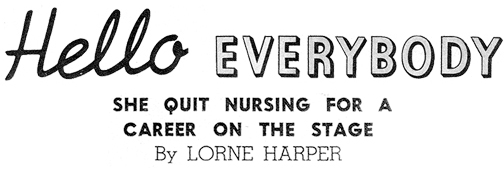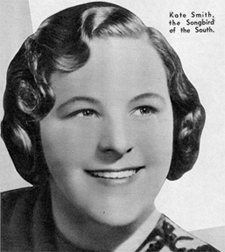Here are 10 things you should know about singer and actress Lillian Roth, born 113 years ago today. She achieved success in vaudeville, nightclubs, concert halls, pictures, radio and on Broadway.
Tag: the Palace Theatre
Times Square Tintypes: Times Square
MY STREET
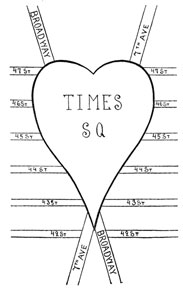 FORTY-SECOND Street and Seventh Avenue . . . Everybody calls it Broadway. The Rialto Theatre. A hanging says it is “The House of Hits”. . . . But the big line is at the Paramount . . . Sightseeing buses . . . Old women sitting in them . . . Making a living as decoys . . . See the Bowery . . . A lecture through Chinatown . . . Why, all the Chinks own restaurants on Broadway . . . There ain’t no Chinamen in Chinatown . . . The chap who is shouting that he is going to point out the historic places . . . Did you know he only arrived here from Portland last week? . . . See the old man selling The Birth Control Review . . . He’s doing it for the wife and kiddies. . . .
FORTY-SECOND Street and Seventh Avenue . . . Everybody calls it Broadway. The Rialto Theatre. A hanging says it is “The House of Hits”. . . . But the big line is at the Paramount . . . Sightseeing buses . . . Old women sitting in them . . . Making a living as decoys . . . See the Bowery . . . A lecture through Chinatown . . . Why, all the Chinks own restaurants on Broadway . . . There ain’t no Chinamen in Chinatown . . . The chap who is shouting that he is going to point out the historic places . . . Did you know he only arrived here from Portland last week? . . . See the old man selling The Birth Control Review . . . He’s doing it for the wife and kiddies. . . .A million lights that dim the stars. . .”
Heart of the World . . .”
A helping hand—they’re all for sale,
On Broadway, Broadway. . . .
When you’re on top;
Same crowd hissing you and dismissing you
If you should flop . . .
Tomorrow is another day . . .
The Heart of the World. . . .”
Fridays with Rudy: Vagabond Dreams Come True, Ch. 11
In Chapter 11 of his 1930 memoir, Vagabond Dreams Come True, Rudy Vallée had reached a point in his career that found him working all day long and sleeping no more than three or four hours a night.
As Rudy describes it below, he and his band had two rehearsals every morning, four live shows a day (five on Saturdays and Sundays) in a vaudeville theatre, and a steady night club gig that went from 11 p.m. till 3 a.m. nightly. Rudy also played a daily tea dance with a different, smaller ensemble backing him up and a dinner show as well.
Who ever said James Brown was the hardest working man in show business? In the laste 1920s, it might just have been Rudy Vallée.
Late to Bed—Early to Rise
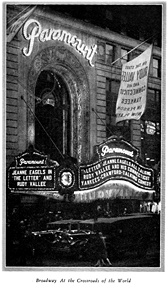 I knew that to be under the management of the National Broadcasting Company gave me a tremendous prestige and would in the end secure me better contracts than any other management could. The National Broadcasting Company secured my Paramount contract at double the figure I had hoped for. Four thousand dollars a week for eight men even for a few weeks was unheard of, but when we did twenty weeks and Paramount announced its intention of exercising its year’s option, the “I-told-you-sos” in the theatrical world who had predicted only ten weeks for us with Publix theatres were completely flabbergasted.
I knew that to be under the management of the National Broadcasting Company gave me a tremendous prestige and would in the end secure me better contracts than any other management could. The National Broadcasting Company secured my Paramount contract at double the figure I had hoped for. Four thousand dollars a week for eight men even for a few weeks was unheard of, but when we did twenty weeks and Paramount announced its intention of exercising its year’s option, the “I-told-you-sos” in the theatrical world who had predicted only ten weeks for us with Publix theatres were completely flabbergasted.Fridays with Rudy: Vagabond Dreams Come True, Ch. 10
In Chapter Ten of Rudy Vallée’s 1930 memoir, Vagabond Dreams Come True, Rudy relates tales of a ten-week tour that covered a half-dozen vaudeville theatres scattered across New York City, in every borough save Staten Island. Rudy and his band even played the very top theatre in all of vaudeville, the Palace.
The band’s radio audience turned out in droves to see them do their stuff in person, and Rudy could tell the tour was a big success, thanks to what he describes as “the telepathic interchange of appreciation with which the air [became] charged.” (We know, we know—it had us scratching our heads, too.)
Vaudeville
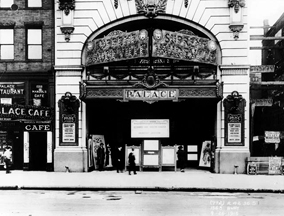 While this was still in the air I read in the monthly magazine of my fraternity, Sigma Alpha Epsilon, that Lawrence Schwab, the first half of the great musical comedy producing team, Schwab and Mandel, was a fraternity brother of mine, that he had struggled for recognition as a boy and now was perhaps America’s foremost producer of intimate musical comedies, and that in “Good News,” that latest Schwab and Mandel effort, they had used George Olsen. Olsen, however, was in Ziegfeld’s “Whoopee” and would not be available should they desire his services in the near future, so I approached Mr. Schwab, hoping to convince him that we might be useful in one of his future musical comedies. I told him that I did not wish to presume on our being fraternity brothers, but I did feel that we had something different to offer which, spotted in one of his musical comedies, might prove of value to him.
While this was still in the air I read in the monthly magazine of my fraternity, Sigma Alpha Epsilon, that Lawrence Schwab, the first half of the great musical comedy producing team, Schwab and Mandel, was a fraternity brother of mine, that he had struggled for recognition as a boy and now was perhaps America’s foremost producer of intimate musical comedies, and that in “Good News,” that latest Schwab and Mandel effort, they had used George Olsen. Olsen, however, was in Ziegfeld’s “Whoopee” and would not be available should they desire his services in the near future, so I approached Mr. Schwab, hoping to convince him that we might be useful in one of his future musical comedies. I told him that I did not wish to presume on our being fraternity brothers, but I did feel that we had something different to offer which, spotted in one of his musical comedies, might prove of value to him.Snapshot in Prose: Kate Smith
Most folks today who have any notion at all of Kate Smith think of her as a big gal with a big voice belting patriotic tunes in bombastic fashion. It’s hard to imagine her taking a pratfall, performing a soft shoe routine, or even offering a gentle rendition of a love song.
Kate Smith — “Maybe It’s Love”
But as is confirmed by this week’s edition of Snapshot in Prose, in her prime, Smith was a much more versatile performer than is recalled by most today. She was hugely popular, recording many hit renditions of the popular tunes of the day. And earlier in her career, she appeared in stage musicals, where she was respected as a comedienne and even a dancer (and no, she was not petite in those days).
This profile of Smith, from 1935, captures her at a point in her career when she has experenced great success and popularity but before she had become the sort of singing national monument she is now so widely thought to be.
